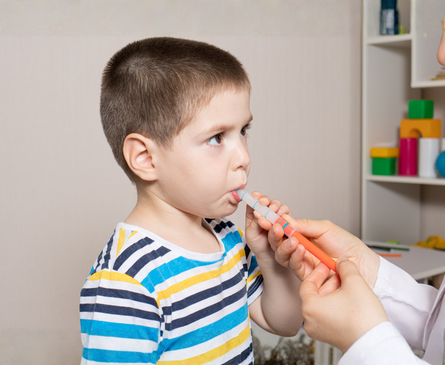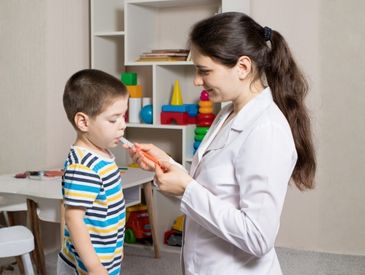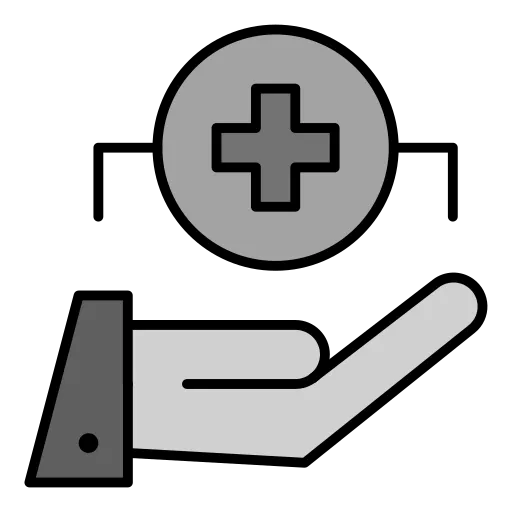
Expert Pediatric Feeding
Therapy for All Ages
Our professional pediatric feeding therapy programs are curated to
help your child eat, swallow, and enjoy mealtimes with confidence.
- Strengthen Oral and Facial Muscles
- Improve Chewing and Swallowing Skills
- Foster Independent Eating
Struggling with Mealtime Battles?
Watching your child refuse food or struggle to swallow can be overwhelming and stressful for any parent. At Hope AMC, we recognize these challenges and know that every mealtime frustration affects both your child’s nutrition and confidence. Our pediatric feeding therapy in Dubai focuses on more than just improving eating skills. We provide tailored guidance, emotional support, and practical strategies for families. Our skilled feeding therapists in Dubai design customized plans to tackle issues like selective eating, oral motor difficulties, and swallowing concerns, helping your child develop safe and independent eating habits.
Hope AMC offers a clear path forward
Key Benefits of Pediatric Feeding Therapy for Your Child’s Growth

What is Pediatric Feeding Therapy?
- Evidence-based therapy designed to improve eating and swallowing skills
- Breaks down feeding challenges into manageable steps
- Uses positive reinforcement to encourage progress at mealtimes
- Focuses on measurable improvements in chewing, swallowing, and food acceptance
- Effective for children with pediatric feeding disorders, picky eating, and swallowing disorder
- Supports overall nutrition, oral motor development, and mealtime confidence

Play-Based Approach
- Engages children through fun, interactive eating activities
- Builds chewing, swallowing, and self-feeding skills naturally
- Encourages positive mealtime behaviors in a supportive environment
- Strengthens the child-therapist relationship
- Promotes sensory exploration and comfort with different foods

Focus Areas
- Oral motor strength and tongue movement
- Chewing, swallowing, and safe drinking skills
- Increasing acceptance of varied foods and textures
- Mealtime independence and self-feeding
- Sensory and behavioral adaptations for feeding
- Supporting hydration, nutrition, and overall growth

How Pediatric Feeding Therapy Supports Your Child
Mealtime struggles can be stressful and exhausting for both children and parents. At Hope AMC, our pediatric feeding therapy in Dubai is designed to tackle these challenges with care and expertise. By carefully assessing each child’s feeding habits, oral motor skills, and sensory preferences, our professional feeding therapists in Dubai create a tailored program that encourages safe and confident eating. Through structured exercises, sensory-based activities, and guided practice, children gradually learn to chew, swallow, and explore new foods. Our therapy not only improves their nutrition and hydration but also fosters independence, reduces mealtime anxiety, and helps children feel more comfortable with a variety of textures and flavors. With consistent support, children gain essential skills for lifelong healthy eating habits, while parents gain peace of mind knowing their child is progressing safely.
How Pediatric Feeding Therapy Impacts Your Child’s Health
A comprehensive pediatric feeding therapy program in Dubai goes beyond improving mealtime skills. It significantly enhances your child’s overall health and development. Our structured, evidence-based approach supports children with feeding challenges, picky eating, or swallowing disorders, helping them gain confidence, nutrition, and independence.
Here’s how feeding therapy for toddlers at Hope AMC positively affects overall growth:
- Improves chewing, swallowing, and oral-motor coordination
- Reduces frustration and anxiety during mealtimes
- Encourages acceptance of new foods and textures
- Supports proper nutrition, hydration, and digestive health
- Boosts independence, confidence, and self-feeding skills

Ready to Empower Your Child?
Key Advantages of Pediatric Feeding Therapy
At Hope AMC, our pediatric feeding therapy in Dubai is carefully designed to address a child’s individual eating and swallowing challenges. Each session is personalized to help children gain confidence, improve nutrition, and develop safe, independent eating habits.
Through evidence-based techniques, our skilled feeding therapists in Dubai guide children in building oral-motor strength, mastering chewing and swallowing, and gradually expanding their acceptance of different foods and textures. The therapy also helps reduce mealtime stress, supports healthy growth, and fosters a sense of independence and accomplishment in daily eating routines.
Parents searching for feeding therapy nearby can trust Hope AMC to provide compassionate care and measurable progress for every child’s feeding journey.
What Techniques Are Used in Pediatric Feeding Therapy?
At Hope AMC, our pediatric feeding therapy in Dubai employs a variety of proven techniques to help children overcome eating and swallowing challenges. These methods support oral-motor development, safe swallowing, and confident mealtime behaviors.
Each session is customized by our experienced feeding therapists in Dubai to address your child’s specific needs. This personalized approach ensures that progress is practical, safe, and meaningful, helping your child gradually develop healthy feeding habits.

Oral Motor and Facial Muscle Exercises

Chewing and Swallowing Coordination Activities

Sensory-Based Food Exploration

Guided Practice with Different Food Textures and Utensils

How Is Pediatric Feeding Therapy Carried Out?
Our pediatric feeding therapy in Dubai follows a structured and individualized approach, designed to meet each child’s specific eating and swallowing needs. At Hope AMC, we ensure every child receives focused, goal-oriented care tailored to their abilities and challenges.
Initial Assessment: We begin with a comprehensive evaluation of your child’s oral-motor skills, swallowing patterns, sensory preferences, and mealtime behaviors.
Personalized Feeding Plan: Based on the assessment, our feeding therapists in Dubai design a customized therapy plan with clear goals to address your child’s feeding difficulties.
Parental Involvement: Parents and caregivers are actively guided on strategies to practice at home, creating a consistent and supportive mealtime environment.
Different Types of Pediatric Feeding Therapy
To achieve the best outcomes, it’s important to work with an experienced feeding therapist who specializes in children’s eating challenges. Hope AMC provides comprehensive, individualized programs to improve chewing, swallowing, acceptance of various foods, and overall mealtime independence.

Role of the Feeding Therapist
Our experienced feeding therapists in Dubai carefully evaluate each child’s feeding challenges and design personalized, evidence-based therapy plans.

Oral-Motor and Swallowing Development
The therapy sessions strengthen key oral and facial muscles, improve tongue and jaw coordination, and guide safe swallowing.

Early Intervention in Pediatric Feeding Therapy
Timely intervention is essential for lasting success. Our specialists work with children to build independent eating skills, to ensure proper nutrition, healthy growth, and long-term wellbeing.
Why Choose Hope AMC for Pediatric Feeding Therapy in Dubai?

Certified Professionals
Our pediatric feeding therapy in Dubai is provided by certified feeding therapists with specialized training in pediatric oral-motor development, swallowing, and feeding disorders.

Holistic Approach
We take a whole-child approach, addressing not just feeding skills but also sensory, behavioral, and emotional aspects that influence mealtime success and overall wellbeing.

Individualized Programs
Using evidence-based techniques, our therapy plans help children improve chewing, swallowing, acceptance of foods, and mealtime independence, while boosting confidence and reducing anxiety.

Customizable Care
Each feeding therapy program is tailored to your child’s developmental stage, specific challenges, and family routines, ensuring practical, measurable progress that fits seamlessly into daily life.
What Precautions Should Parents Take When Considering Pediatric Feeding Therapy?
Choosing the right pediatric feeding therapy in Dubai for your child can feel overwhelming. As a parent, your awareness and involvement play a crucial role in your child’s progress.
Choose Skilled Feeding Therapists
Look for certified feeding therapists experienced in helping children overcome eating difficulties, develop safe swallowing skills, and build confidence at mealtimes.
Maintain Open Communication
Stay in regular contact with your child’s therapist. Ask questions, share observations, and actively participate in discussions about your child’s progress and challenges.
Stay Involved During Therapy
Your presence and encouragement during sessions help your child feel supported and motivated to try new foods and practice new skills.
Ensure Consistency at Home
Reinforce the exercises, strategies, and mealtime routines introduced during therapy at home. This helps strengthen learning, improve habits, and maintain steady progress.
Every small improvement counts. With the right support, care, and collaboration between parents and therapists, your child can develop safe, independent eating skills and thrive both during therapy and at home.

How Pediatric Feeding Therapy Benefits Children
Our feeding therapy for toddlers at Hope AMC helps children:
- Strengthen oral-motor and swallowing skills
- Increase acceptance of various foods and textures
- Build confidence and independence at mealtimes
- Reduce anxiety and frustration during eating
- Support overall nutrition, growth, and wellbeing
Where to Find the Best Pediatric Feeding Therapy in Dubai
Hope AMC offers evidence-based pediatric feeding therapy in Dubai with certified feeding therapists, personalized therapy plans, and family guidance. With us, every child receives an individualized program tailored to their unique needs.

كان الجميع هناك ودودون ، وكان المعالج محترفًا للغاية وحازمًا وصبورًا. يمكنك رؤية التغيير على طفلك بسرعة كبيرة. موصى بة بشدة.
التعليم الطبي المستمر هو بالتأكيد تغيير قواعد اللعبة وقد نجح في إحداث المعجزات. يمكننا أن نرى جذعًا أقوى ووضعية أفضل خلال فترة قصيرة من 3 أسابيع. كانت السيدة ليليانا هي المعالج الذي عمل مع عناية وقد قامت بعمل رائع. كل شخص تعاملنا معه في Hope كانوا ودودين ومتعاونين.
السيدة خشبو والسيد عادل ، أخصائيو العلاج الطبيعي لدينا كانوا رائعين. كلهم تأكدوا من فهمنا لما تم فعله وكيف ولماذا. والأهم من ذلك أنهم قاموا بتزويدنا بالمعرفة والمهارات والتمارين لمواصلة برنامجنا المنزلي ، وهو أمر مهم جدًا بالنسبة لنا نحن الآباء.
السيدة أمل طلبة ، مديرة ومؤسس Hope ، شخصية مدهشة ورحيمة ومتواضعة. لقد ذهبت إلى أبعد من ذلك للتأكد من أننا كنا مرتاحين وكانوا دائمًا متاحين لإرشادنا. أنا أشعر بالرهبة منها والتزامها تجاه جميع الأطفال وعائلاتهم الذين لمستهم من نواح كثيرة. تقدم الابنة. بارك الله فيكم جميعا.
اخصائيين على مستوى عالي صراحة .. انتهينا من فترة العلاج الاولى و لنا عودة قريبة ب اذن الله.. 🇸🇦
معالج محترف يعمل بجد. إدارة جيدة وأنا أوصي بشدة
Meet Our Expert Therapists
Insurance & Next Steps
Accessibility + transparency



FAQs
What is pediatric feeding therapy?
Pediatric feeding therapy is a specialized program to help children overcome eating and swallowing difficulties safely and confidently.
How do I know if my child needs feeding therapy?
Signs include refusal of age-appropriate foods, difficulty chewing or swallowing, limited food variety, or unsafe mealtime behaviors.
What happens during a feeding therapy session?
Therapists guide children through exercises for oral-motor strength, chewing, swallowing, and sensory exploration in a structured, supportive way.
Can feeding therapy help picky eaters?
Yes! Therapy gradually introduces new foods and textures to expand acceptance and reduce mealtime stress.
How long does pediatric feeding therapy take?
The duration depends on the child’s needs, typically ranging from a few weeks to several months with consistent sessions.
Is feeding therapy safe for infants and toddlers?
Absolutely. Therapists customize each program based on age, abilities, and developmental stage to ensure safe eating and swallowing.
Can feeding therapy address medical or sensory issues?
Yes. Therapy supports children with oral-motor, sensory, or swallowing challenges, as well as those recovering from feeding-related medical conditions.
How often should my child attend therapy?
Frequency varies, but most children benefit from 1–3 sessions per week, combined with home practice guided by parents.
How can I book pediatric feeding therapy at Hope AMC?
Call us or visit our official website to schedule a consultation with our certified feeding therapists.



